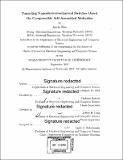Tunneling nanoelectromechanical switches based on compressible self-assembled molecules
Author(s)
Han, Jinchi
DownloadFull printable version (15.48Mb)
Alternative title
Tunneling NEM switches based on compressible self-assembled molecules
Other Contributors
Massachusetts Institute of Technology. Department of Electrical Engineering and Computer Science.
Advisor
Vladimir Bulović and Jeffrey H. Lang.
Terms of use
Metadata
Show full item recordAbstract
Nanoelectromechanical (NEM) switches are investigated as a promising candidate for energy-efficient logic devices. They promise quasi-zero static leakage, large on-off current ratio, small subthreshold slope and high robustness in harsh environments. However, strong van der Waals interaction at the nanoscale usually results in high hysteresis and the risk of stiction failure, thereby bringing about an inevitably high actuation voltage and unfavorable dynamic power consumption in practical device designs. The low switching speed, poor reliability and absence of scalable manufacturing technique also set barriers to the maturation of NEM switches to complement or substitute semiconductor transistors for applications with energy constraints. To accelerate the development of NEM switches for digital logic, this thesis presents a novel squeezable NEM switch, termed a "squitch", based on direct tunneling through a metal-molecule-metal junction, whose tunneling gap can be electromechanically modulated by compressing the molecular layer. A sub-5 nm change in the tunneling gap in the absence of direct contact between electrodes leads to at least several orders of magnitude current modulation, enabling a squitch to exhibit a low actuation voltage near 2 V, a low hysteresis and a high switching speed, which support the prospects of squitches as ultra-low power beyond-CMOS devices. A scalable and versatile dielectrophoretic trapping technique for fabrication of devices involving nanoparticles in design has also been developed in this thesis as a critical fabrication step.
Description
Thesis: S.M., Massachusetts Institute of Technology, Department of Electrical Engineering and Computer Science, 2018. Cataloged from PDF version of thesis. Includes bibliographical references (pages 115-122).
Date issued
2018Department
Massachusetts Institute of Technology. Department of Electrical Engineering and Computer SciencePublisher
Massachusetts Institute of Technology
Keywords
Electrical Engineering and Computer Science.